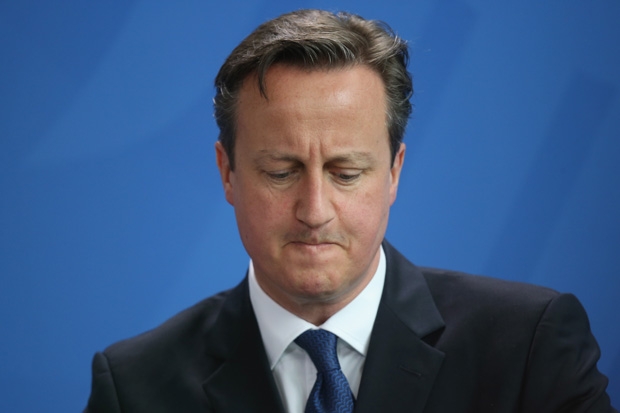David Cameron is now facing the biggest challenge of his leadership: how to renegotiate Britain’s membership of the EU without destroying his party. His dilemma mirrors the situation of Harold Wilson 40 years ago this month. So far, the old Labour man looks the better strategist.
Wilson, who had a majority of three, avoided mass resignations from his cabinet by suspending the convention that members of the government must back its entire programme in public. Of his 23 cabinet ministers, seven joined the campaign for Britain to leave the EU. They didn’t win the argument — but they ensured that the question was properly debated, and settled for many years afterwards.
David Cameron need only have followed that example. Instead, he began the week threatening Eurosceptics with the sack unless they agreed to support the government’s case for a ‘yes’ vote in the referendum — a position he hurriedly abandoned as the dissent it would create became clear.
With this flip-flop, the Prime Minister has not merely risked party discipline. He has also undermined his negotiating position in Europe. It has been clear since his passionate speech at Bloomberg’s offices in London two years ago, when he first promised this referendum, that he wanted Britain to remain part of a reformed Europe. Yet there remained the implicit threat that if he didn’t get his way in the renegotiation, he would recommend that the country vote to leave.
Just how seriously the EU’s leaders took this threat became clear within hours of the Conservatives’ outright general election victory. Having previously said there could not possibly be any changes to EU treaties until 2019, Jean-Claude Juncker suddenly declared, ‘I stand ready to work with you to strike a fair deal for the United Kingdom.’
Cameron should be making the most of a strong position. The argument that Britain is on the metaphorical edge of Europe doesn’t stand up when it comes to finances. We are the EU’s second largest paymaster, and one of only ten net contributors. On trade, too, the EU needs us more than we need them. In the highly unlikely scenario of the rest of the EU trying to erect trade barriers against a departing Britain, their businesses would come off worse. Last year, we exported £146 billion worth of goods and services to other EU countries, and imported £218 billion.
Yet there is little to suggest that the Prime Minister is prepared to make the most of a strong hand. His most public demand so far is for powers to restrict benefits to citizens of other EU states until they have been living here for four years — a welcome reform that could equally well be achieved through redesigning our benefits system along the contributory lines of several other countries.
He has stated that he wants less regulation — without specifying which regulations should go — and that he wants to remove the requirement in the Treaty of Rome for ‘ever-closer union’. It is self-evident that Britain could never accept becoming part of a single European nation, as that phrase appears to demand. But as with Labour’s Clause IV, the change would be largely symbolic: the idea of a United States of Europe has been dead for a very long time.
There is one of David Cameron’s requested reforms that we can enthuse about: he demanded in his 2013 speech that the single market should be extended to digital services — which would hugely boost Britain’s opportunities to export to the rest of the EU. But he has not indicated that he will seek such important reforms as more democracy in EU institutions, more accountability in its finances, the restoration of a national veto on EU legislation not essential to the workings of the free market, or a limit to EU competence over defence and foreign policy.
The polls indicate that the EU referendum could go the same way as in 1975: a comfortable majority for ‘yes’. But priced into those polls is the assumption that David Cameron will obtain a properly renegotiated settlement with the EU. The polls also indicate a large number of undecided voters, who could presumably be swayed by the deal. And in any case, after 7 May, who has confidence in opinion polls?
What is very different from 1975 is the economic situation. Then Britain was widely seen as the sick man of Europe, in need of some European-style discipline in finances and labour relations. Now it is Britain which offers the better example of how to run an economy and how to regulate the labour market — i.e., not very much.
David Cameron needs two things out of the referendum: to keep his party together and to obtain the best deal for Britain. The first he can manage by granting the sort of freedom that Harold Wilson granted his ministers 40 years ago. The second he will only achieve if he appreciates what a strong position he is in, and approaches his negotiations with an ambition that matches the passion of his Bloomberg speech.






Comments